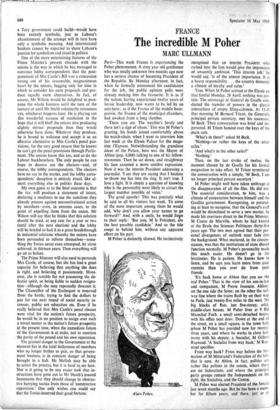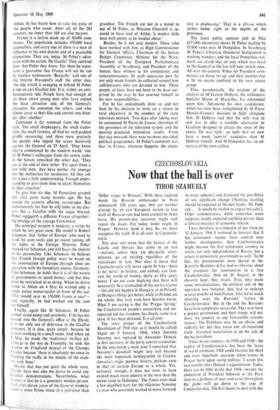The incredible M Poher
FRANCE MARC ULLMANN
Paris—This week France is experiencing the Poher phenomenon. A sixty year old gentleman who was totally unknown two months ago now has a serious chance of becoming President of the Republic. By Monday afternoon, in fact, when he formally announced his candidature for the job, the public opinion polls were already making him the favourite. It is as if the nation, having experienced twelve years of heroic leadership, now wants to be led by an anti-hero : as if the France of the middle bour- geoisie, the France of the municipal chambers, bad awoken from a long slumber.
'There you are. The weather's lovely and there isn't a sign of chaos.' This was M Poher's greeting, his hands joined comfortably above his watch-chain, when I went to interview him last week at the Elysde Palace for the maga- zine l'Express. Notwithstanding the grandiose ddcor of the Palace, here was the Mayor of Ablon (pop. 6,000) talking to one of his fellow- townsmen. Then he sat down, and straightway his face assumed a more sombre expression. Now it was the interim President addressing a journalist. 'I see they are saying that I hesitate to throw my hat into the ring. It isn't true. I love a fight. It is simply a question of knowing who is the personality most likely to attract the largest number possible of votes.'
The good apostle! This was precisely what he said to all his visitors last week. To some of the most important among them he would add, 'why don't you allow your names to go forward?' And, with a smile, he would listfn to their reply : 'But you, M le Prdsident, are the best possible candidate.' And so the tide swept in behind him, without any apparent effort on his part.
M Poher is distinctly shrewd. He instinctively Alain Poher. recognised that an interim President who rushed into the lists would give the impression of unseemly ambition. 'This interim job,' he would say, 'is of the utmost importance. It is a heavy responsibility . . . the country demands a climate of loyalty and calm.'
True. When M Poher arrived at the Elys6e on that fateful Monday, 28 April, nothing was cer- tain. The entourage of General de Gaulle con- ducted the transfer of powers in the glacial atmosphere of empty filing-cabinets. At 11.45 that morning M Bernard Tricot, the General's principal private secretary, met his successor, M Beck. Their conversation was brief and im- personal. M Tricot handed over the keys of the .main safe.
'What's in there?' asked M Beck.
Nothing—or rather the keys of the other safes.'
'And what's in the other safes?'
'Nothing.'
Then, on the last stroke of twelve, the moment chosen by de Gaulle for his formal resignation to take effect, M Tricot terminated the conversation with a simple, 'M Beck, I am no longer principal private secretary.'
M Poher might well have taken umbrage at the disappearance of all the files. He did not.
The essential consideration, to him, was a climate of cooperation between himself and the Gaullist government. Recognising, or pretend- ing at least to recognise, that the General's staff would be disinclined to serve a new master, he made his overtures direct to the Prime Minister, M Couve de Murville, whom he hid known at the Ecole des Sciences Politiques thirty-five years ago. The two men agreed that their per- sonal divergences of outlook must fade into the background. What mattered, in the circum- stances, was that the institutions of state should function normally. M Poher's personality made this much easier. He doesn't go in for histrionics. He is patient. He knows how to listen, and he says you learn more from your enemies than you ever do from your friends.
'It's back home at Ablon that you see the real Poher.' That is the view of his son-in-law and companion, M Pierre Joussain. Ablon: on the one side the Seine; on the other the rail- way line where the trains flash by on their way to Paris, just twenty-five miles to the west. No big blocks of flats, just five-storey, solid, middle-class houses. M Poher lives at 9 Bld Marechal Foch, a small semi-detached house, with his office next door. Down at the end of the street, on a small square, is the town hall, where M Poher has presided now for twenty- three years, and where he works in close har- mony with his deputy. a Socialist, M Gilbert Raynaud. 'A Socialist from way back,' M Ray- naud specifies.
From way back? From way before the for- mation of M Mitterand's Federation of the left, that is sure. At Ablon, in fact, politics are rather like politics in the senate, where there are no federations, and where the principal party groups remain the Independents on the right, the Socialists, and the Centre. M Poher was elected President of the Senate just seven months ago. But he has been a mem- ber for fifteen years; and there, just as at Ablon, he has learnt how to take the pulse of the people who count. After all, of the 283 senators, no fewer than 168 are also mayors.
France is a nation made up of 30,000 com- munes. The population includes 470,000 local counsellors, and every one of them is a man of influence in his own district and of a peaceable disposition. They are, today, M Poher's advo- cates with the nation. De Gaulle? They admired
him: but Poher they know. For them he repre- sents a guarantee that France will not be run
by faceless technocrats. 'Basically,' said one of the interim President's staff the other day, 'the tide which is sweeping in behind M Poher is not an anti-Gaullist tide. It is, rather, an anti- bureaucratic tide. People have had enough of all those smart young men who have copied the least attractive side of the General's character, his contempt for others, and who labour away at their files and commit one blun- der after another.'
Contempt is far removed from the Poher style. The small shopkeepers, the small trades- men, the small farmers, all find his well-padded profile reassuring; and these were precisely the people who tipped the scales decisively against the General on 27 April. 'They know they're condemned by the modern world,' one of M Poher's colleagues from the centre ranks in the Senate remarked the other day. `They are at the end of their tether. Yet apart from a few wild men, they have neither the courage nor the inclination for revolution. All they ask for is just a little understanding. Enough under- standing to give them time to adapt themselves to their situation.'
To give him his due, M Pompidou grasped this vital point many months ago. He has toured the country offering reassurance. But unfortunately for him he still looks to the elec- tors like a Gaullist with the edges blurred. Poher represent§ a different France altogether: the revenge of the average Frenchman.
His principal weapon is modesty, a virtue by which he sets great store. His model is Robert Schuman, that 'father of Europe' who used to wash his own socks and go round turning off the lights at the Foreign Ministry. Poher worked for Schuman, and still bears the imprint of his personality. Like Schuman. he believes that French foreign policy must be based on the construction of Europe through close co- operation with the hereditary enemy, Germany. Like Schuman, he holds that it is of the nature of governments to spend money. and that they must be restrained in so doing. When he drove home to Ablon on 4 May he wanted only a single police motor-cyclist in front of his car. That would save us 150,000 francs a year'— and, typically, he had worked out the_ stun for himself.
Finally, again like M _Schuman. M Poher cannot stand pomp and ceremony. If he has not moved into the General's office at the Elysee, it is nbt only out of deference to the Gaullist ministers. It is also, quite simply, because he prefers working in a small room. And when, on 8 May, he made the traditional ve-Day pil- grimage to the Arc de Triomphe, he took the Avenue de Friedland instead of the Champs Flyst!es because 'there is absolutely no sense in blocking the traffic in the middle of the even- ing. rush hour.'
Maybe that was not quite the whole story. Maybe' there was also the desire to avoid any Gaullist demonstrations. Nevertheless, what matters is that be is a genuinely modest person. And after eleven years of the General modesty seems a more fitting virtue in a politician than grandeur. The French are not in a mood to say of M Poher, as Winston Churchill is re- puted to have said of Attlee, 'a modest little man with plenty to be modest about:
Besides, he is not only modest. Those who have worked with him, as High Commissioner for German Affairs, Chairman of the Senate Budget Committee, Minister for the Navy, President of the European Parliamentary Assembly at Strasbourg, and President of the Senate, bear witness to his competence and conscientiousness. In each successive post he not only made friends, he collected around him collaborators who are devoted to him. These people, at least, have not been in the least sur- prised by the way he has asserted himself in his new responsibilities.
For he has undoubtedly done so, and not least by his decision to insist on a return to total objectivity in the conduct of the state television network. Two days after taking over he summoned M Pierre de Leusse, chairman of the governors of the television system, and the meeting produced immediate results. From that day onwards there were no more one-sided political programmes. M Poher's comment was that 'in France. whatever happens, the exces-
sive is displeasing.' That is a phrase which strikes home, right to the depths of the provinces.
The latest public opinion poll in. Nice (177,000 electorate) shows M Poher leading by 15,000 votes over M Pompidou. In Strasbourg M Poher's Christian Democrat background is working wonders, and the local Pompidou stal- warts are afraid that an area which was loyal to the General to the last will now switch sides. All over the country 'Poher for President' com- mittees are being set up, and their membership is by no means confined to his own centre group.
Thus, paradoxically, the wisdom of the analysis of M Gaston Defferre, the millionaire Socialist Mayor of Marseilles, has rebounded upon him. Advancing his own candidature, which has now been strengthened by M Pierre Mendes-France's decision to fight alongside him, M Defferre said that the only way to win was to offer a credible alternative to Gaullism designed to attract the votes of the centre. He was right : so right that we now have a more 'centrist' candidate than M Defferre himself. And M Pompidou has an ad- versary of his own calibre.







































 Previous page
Previous page